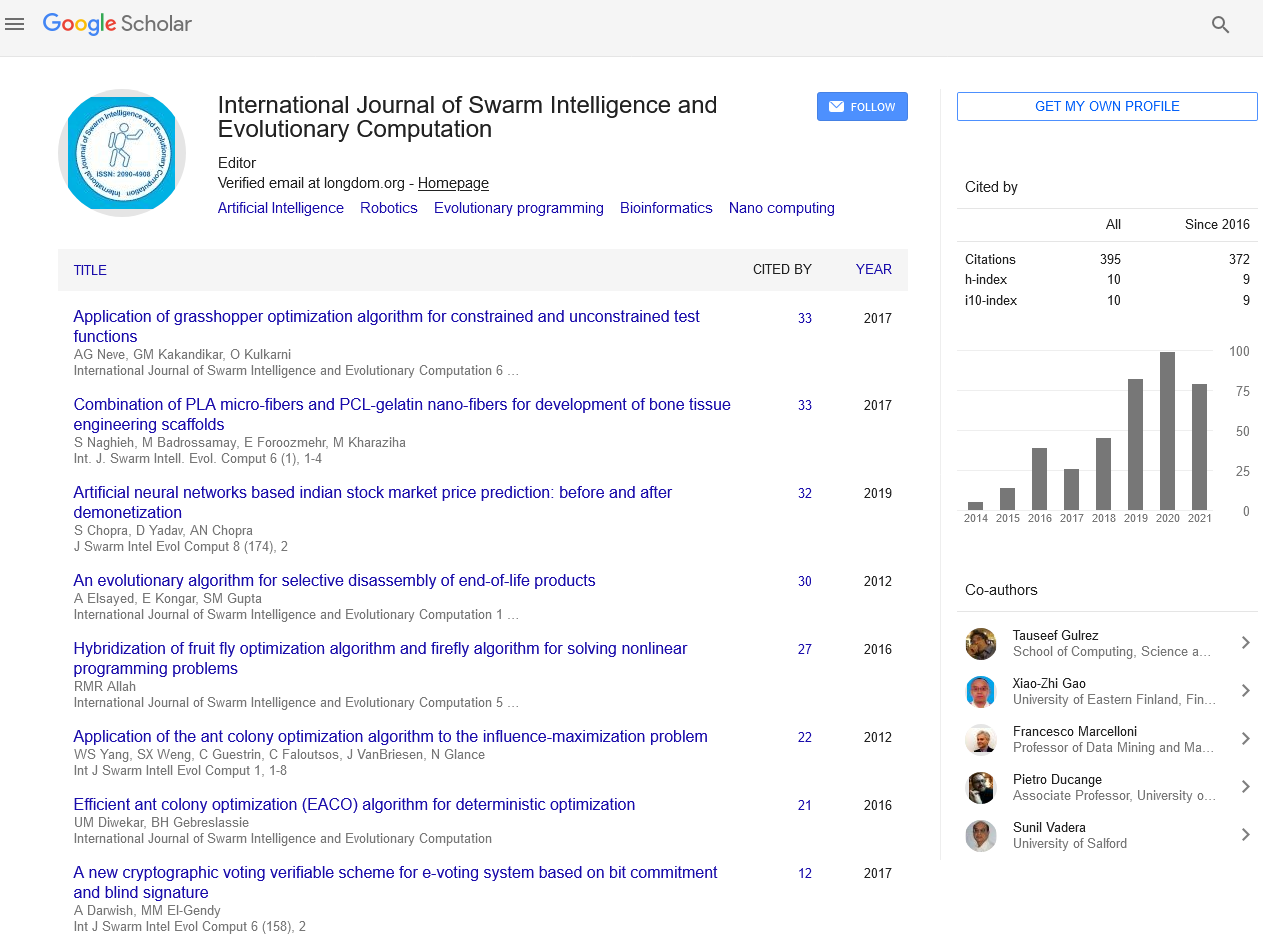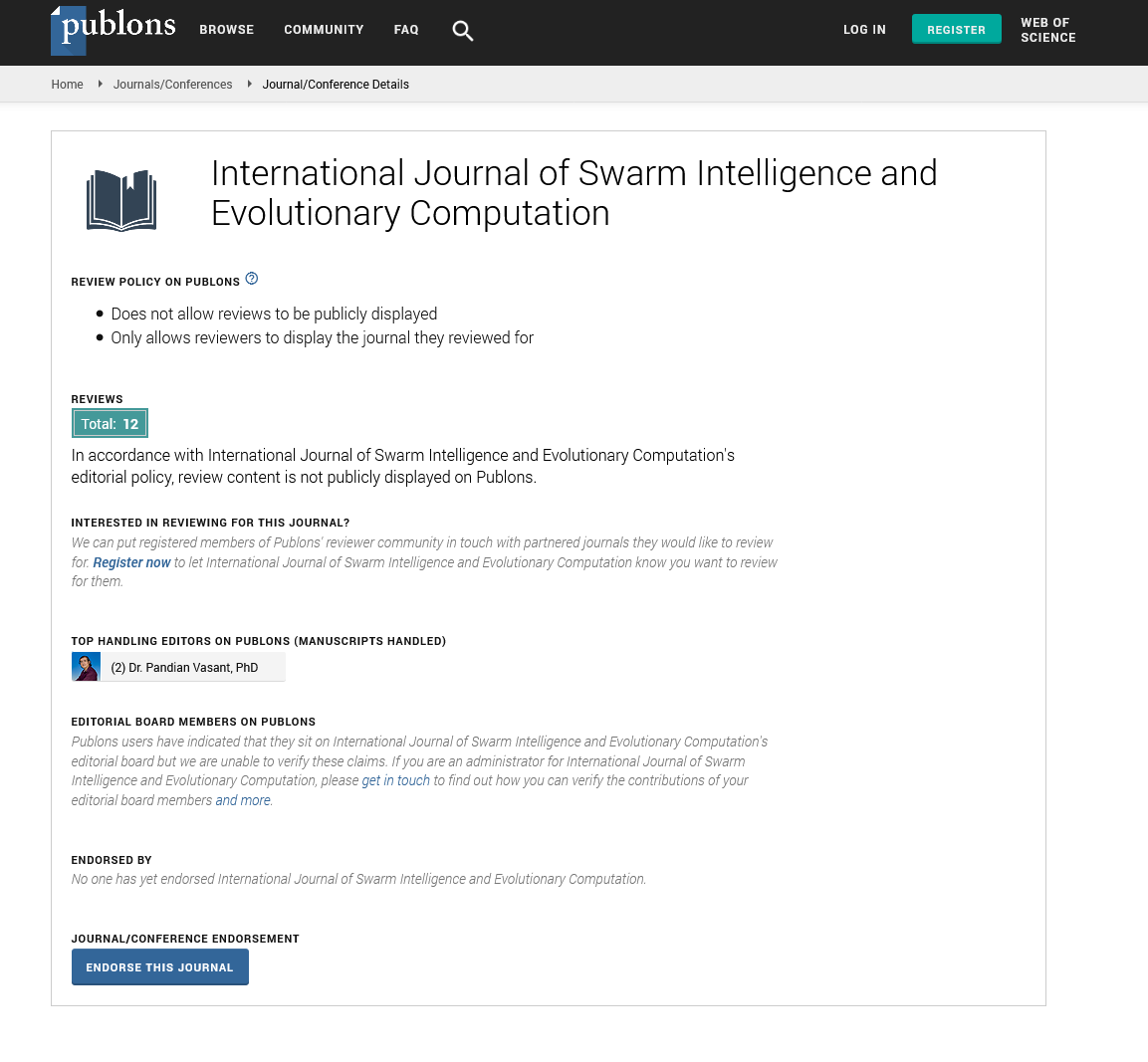Indexed In
- Genamics JournalSeek
- RefSeek
- Hamdard University
- EBSCO A-Z
- OCLC- WorldCat
- Publons
- Euro Pub
- Google Scholar
Useful Links
Share This Page
Journal Flyer

Open Access Journals
- Agri and Aquaculture
- Biochemistry
- Bioinformatics & Systems Biology
- Business & Management
- Chemistry
- Clinical Sciences
- Engineering
- Food & Nutrition
- General Science
- Genetics & Molecular Biology
- Immunology & Microbiology
- Medical Sciences
- Neuroscience & Psychology
- Nursing & Health Care
- Pharmaceutical Sciences
Perspective - (2023) Volume 12, Issue 2
Exploring the Potential of Bio-Robotic Intelligence: Challenges and Applications
David Ian*Received: 22-Feb-2023, Manuscript No. SIEC-23-20956; Editor assigned: 24-Feb-2023, Pre QC No. SIEC-23-20956(PQ); Reviewed: 10-Mar-2023, QC No. SIEC-23-20956; Revised: 17-Mar-2023, Manuscript No. SIEC-23-20956(R) ; Published: 27-Mar-2023, DOI: 10.35248/2090-4908.23.12.306
Description
Bio-robotic intelligence is a field of study that combines the principles of biology, robotics, and artificial intelligence to develop intelligent systems that mimic biological processes. These systems have the potential to revolutionize several fields, including healthcare, agriculture, manufacturing, and transportation. The development of bio-robotic intelligence is expected to lead to the creation of intelligent machines that can learn, adapt, and evolve, just like living organisms.
Current state of bio-robotic intelligence
Bio-robotic intelligence is a rapidly evolving field, and significant progress has been made in recent years. Researchers are studying biological systems to understand the principles that govern them and using this knowledge to develop intelligent machines. For example, researchers are studying the nervous systems of animals to understand how they process sensory information and generate behavior. This knowledge is being used to develop robots that can navigate complex environments and perform tasks that require decision-making. Advances in machine learning and artificial intelligence have also contributed significantly to the development of bio-robotic intelligence. Researchers are using deep learning algorithms to analyze large amounts of data generated by sensors and cameras to identify patterns and make predictions. This approach is being used to develop robots that can recognize objects, learn from their environment, and make decisions based on their observations.
Applications of bio-robotic intelligence
The potential applications of bio-robotic intelligence are vast and varied. Some of the areas where bio-robotic intelligence is expected to have a significant impact include:
Healthcare: Bio-robotic intelligence can be used to develop intelligent prosthetics and exoskeletons that can assist people with disabilities. These devices can be controlled by the user's neural signals, enabling them to perform complex movements and tasks.
Agriculture: Bio-robotic intelligence can be used to develop robots that can monitor crops and detect diseases or pests. These robots can also perform tasks such as planting, watering, and harvesting, reducing the need for manual labour.
Manufacturing: Bio-robotic intelligence can be used to develop intelligent robots that can perform tasks such as assembly, inspection, and quality control. These robots can work alongside human workers, increasing efficiency and productivity.
Transportation: Bio-robotic intelligence can be used to develop autonomous vehicles that can navigate complex environments and make decisions based on their surroundings. These vehicles can reduce accidents and improve traffic flow, leading to safer and more efficient transportation systems.
Challenges
Despite the significant progress made in the field of bio-robotic intelligence, several challenges need to be addressed. One of the significant challenges is the development of intelligent systems that can operate autonomously in unstructured environments. Current robots are designed to operate in controlled environments, and their performance in unstructured environments is limited. Another challenge is the development of intelligent systems that can learn and adapt in real-time. Current machine learning algorithms require large amounts
Conclusion
Bio-robotic intelligence is a promising field of study with vast potential applications. The development of intelligent machines that can learn, adapt, and evolve has the potential to revolutionize several fields, including healthcare, agriculture, manufacturing, and transportation. Despite the challenges, significant progress has been made in recent years, and researchers are working to overcome these challenges. It is expected that bio-robotic intelligence will play a significant role in shaping the future of technology and improving the quality of life for people worldwide.Citation: Ian D (2023) Exploring the Potential of Bio-Robotic Intelligence: Challenges and Applications. Int J Swarm Evol Comput. 12:306.
Copyright: © 2023 Ian D. This is an open-access article distributed under the terms of the Creative Commons Attribution License, which permits unrestricted use, distribution, and reproduction in any medium, provided the original author and source are credited.


